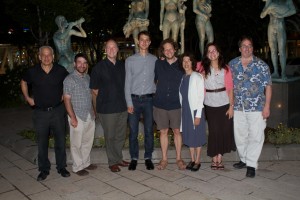left to right: Shimon Ullman, Peter Pantelis, David Pautler, Chris Baker, Josh Tenenbaum, Barbara Tversky, Dare Baldwin, Frank Pollick.
Sapporo, Japan, 1 August 2012
Talk videos and slides in order of presentation
- David Pautler
- Barbara Tversky
- Frank Pollick (video and slides withheld at his request)
- Dare Baldwin (slides not yet available)
- Peter Pantelis
- Shimon Ullman (video and slides withheld at his request)
- Josh Tenenbaum and Chris Baker
Workshop Proposal
Keywords
intention recognition; action understanding; theory of mind; event perception; social cognition; computational modeling; probabilistic inference.
Abstract
Attributing intentions to others based on observations of their behavior is a core cognitive ability. It is also a necessary precursor to social judgments such as judgments about responsibility and morality. The seminal work of Heider and Simmel (1944) highlighted the spontaneity, richness, and range of intention attributions that can be elicited by a stimulus as impoverished as moving geometric figures. Subsequent research has revealed a wide range of visuospatial cues that suggest specific intentions as well as observer attributes that influence judgments. How are such cues and observer attributes integrated into an inferred specific intention? A handful of processing models have used frameworks such as schema-matching or probabilistic inference to integrate such cues. This workshop will address two questions: 1) How have different fundamental paradigms fared in the quest for a model of human intention perception? and 2) What questions about this topic are most in need of answers?
Goals
- To foster on-going communication, and perhaps coordinated research, across disciplines among researchers on this topic.
- To provide an overview for the audience of how different disciplines have approached this topic.
Target Audience
Perception of intentions has been studied by cognitive, social, and developmental psychologists, philosophers, anthropologists, artificial intelligence researchers, and computer vision researchers. The workshop will be most relevant to those working in high-level perception, theory of mind, and plan recognition, but we expect it to be of general interest to many researchers in cognitive, developmental, and social psychology, as well as artificial intelligence, anthropology, and philosophy.
Confirmed Speakers
- Barbara Tversky, Department of Psychology, Stanford University
- Shimon Ullman, Department of Computer Science And Applied Mathematics, Weizmann Institute of Science
- Dare Baldwin, Department of Psychology, University of Oregon
- Frank E. Pollick, Department of Psychology, University of Glasgow
- Josh Tenenbaum, Department of Brain and Cognitive Sciences, MIT
- Chris Baker, Department of Brain and Cognitive Sciences, MIT
- Peter Pantelis, Department of Psychology, Rutgers University
- David Pautler, Programme in Computational Social Cognition, Institute of High Performance Computing, A*STAR
Format
This is a full-day workshop. To allow time for in-depth explorations, we have devoted the entire time to speaker presentations. Each will be 40 minutes including Q&A. There will be coffee and lunch breaks.
Videotaping
We plan to videotape each speaker during their presentation, sync the videos with the slide content, and make both available here after the event.

